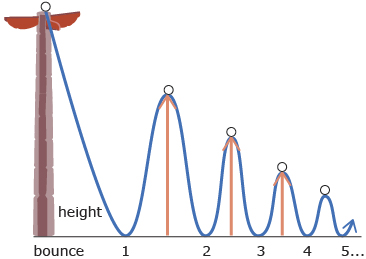Lesson 4
1. Lesson 4
1.9. Explore 5
Module 1: Sequences and Series
Try This 4

iStockphoto/Thinkstock
The world’s largest free-standing totem pole is located in Beacon Hill Park in Victoria, British Columbia. The pole is approximately 128 ft tall.
Imagine that an eagle with a golf ball clasped in its talons is perched at the top of the totem pole. As it flies away, the eagle drops the ball. The ball bounces to 65% of its previous height.
Figure 1

Did You Know?
Totem poles were constructed and raised for many reasons. A pole could be raised as a memorial to a great chieftain or to honour a deceased elder. A pole could also be raised to mark encounters with supernatural beings. In the past, shame poles were displayed to ridicule those individuals or groups who did not repay their debts.
Assume that the ball continues to bounce to 65% of its previous height.
- Calculate and label the first four bounce heights shown in Figure 1.

- The bounce heights in this problem form a sequence. Write the general term for the sequence.

- Use the general term to find the height the ball reaches after the 9th bounce.

![]() Save your work in your course folder.
Save your work in your course folder.
Depending on your selected value of a, substitute an appropriate value (likely 9 or 10) into the general term expression from question 2.)
You need to substitute the values of a and r into the general term tn = arn−1.
Multiply the original height by 0.65 to obtain the height after the first bounce. Continue to multiply by 0.65 to obtain subsequent bounce heights.